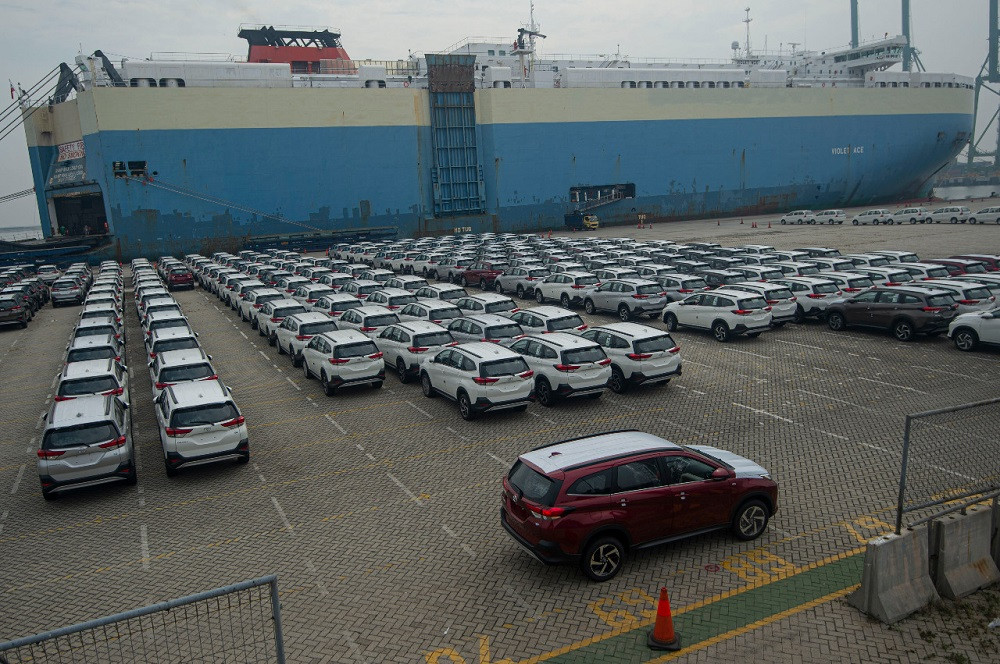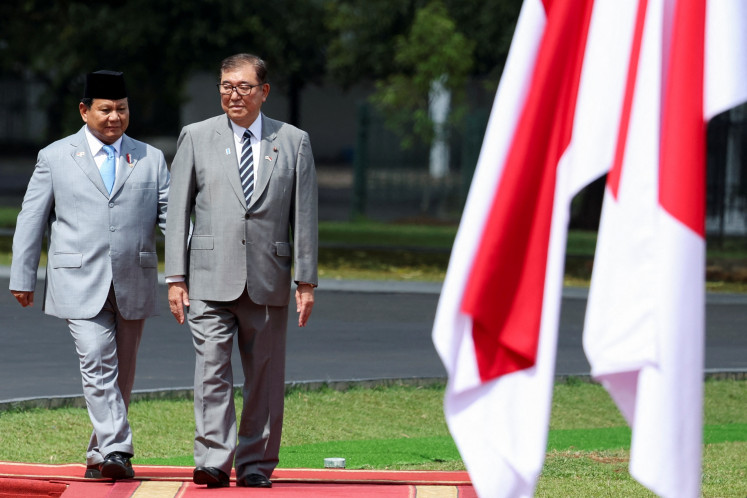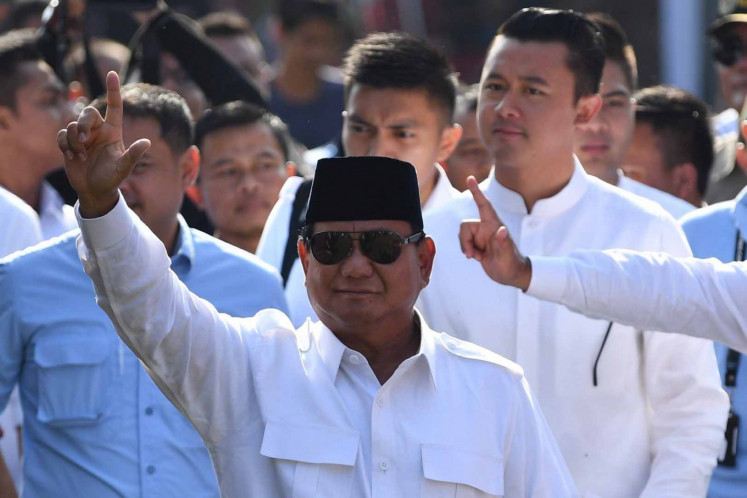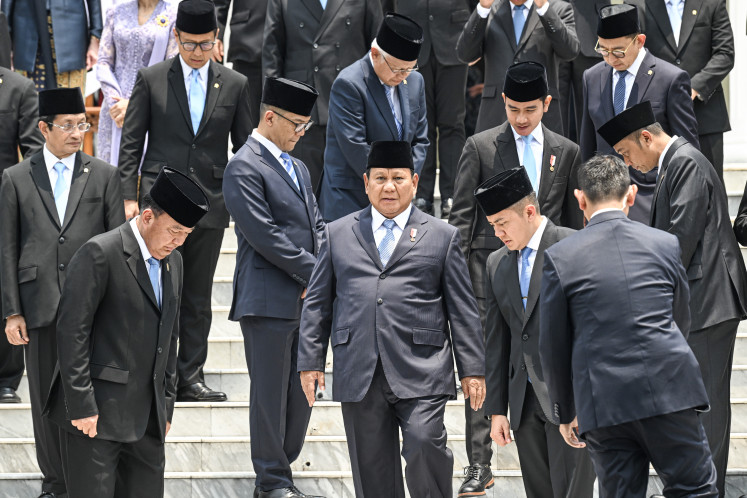Popular Reads
Top Results
Can't find what you're looking for?
View all search resultsPopular Reads
Top Results
Can't find what you're looking for?
View all search resultsJumpstarting Indonesia’s exports amid COVID-19 pandemic
Despite the pessimistic outlook, Indonesia recorded a significant trade surplus in non-oil and gas products from January to August.
Change text size
Gift Premium Articles
to Anyone
The world economies do not seem to be recovering anytime soon to pre-pandemic levels.
In its latest press release published on Oct. 6, the World Trade Organization forecast global trade to shrink by 9.2 percent in 2020, less severe than its forecast in April of a 12.9 percent contraction. However, global trade is expected to grow by only 7.2 percent next year, which is more pessimistic than the previous 21.3 percent growth estimation.
North America and Europe are among the worst hit regions with a declining rate of 14.7 percent and 11.7 respectively of their exports. This is followed by a decline of imports at 8.7 percent in North America and 10.3 percent in Europe. These two regions are considered the traditional premium markets for Indonesia’s products.
Among trade goods, manufactured goods and fuels and mining products are the worst affected. However, agricultural products have experienced a rather minimal decline during the pandemic with a zero to 5 percent decline during the first and second quarters of 2020. Conversely, textiles, pharmaceuticals, electronics and computer products are the only manufactured goods that have experienced positive growth during the pandemic.
Meanwhile, the International Monetary Fund predicted in its latest World Economic Outlook that Indonesia’s gross domestic product is expected to fall by 1.5 percent this year, revising down its previous estimation of a 0.3 percent contraction last June.
Despite the pessimistic outlook, Indonesia recorded a non-oil and gas trade surplus from January to August 2020. It rose a significant 259.01 percent compared to the same period a year before, from US$4.25 billion to $15.27 billion. However, this trade surplus was mainly due to a sharp drop in imports instead of an increase in exports. In the first eight months of the year, Indonesia’s total non-oil and gas exports declined 4.35 percent while imports of such products dropped 15.76 percent.
If we look to Indonesia’s export performance to its top 10 export destination countries, only exports to China and the US recorded positive growth, at 11.29 percent and 1.56 percent respectively. Meanwhile, Indonesian exports to Japan, India, Singapore, Malaysia, the Philippines, South Korea, Thailand and Vietnam were lower year-on-year.
This is not surprising as more countries have imposed various measures to restrict trade. In fact, the latest statistics issued by the WTO show that there were 165 trade-restrictive measures implemented between mid-October 2019 and mid-May 2020, a significantly higher figure compared to the same period a year before when only 38 new trade-restrictive measures were applied.
The WTO also recorded a total of 239 trade remedy actions during the review period. As stated in the report, the monthly average of trade remedy actions initiated was slightly higher than the average for the last eight years. In contrast, the monthly average of trade remedy terminations was the lowest over the same time span.
ASEAN members also seem to be using the trade remedy instrument more to protect their domestic industry from the adverse effects of the COVID-19 pandemic. Thailand, for example, has initiated seven new anti-dumping investigations and two safeguard investigations this year. While the two safeguard investigations target imports from all countries including Indonesia, one out of seven of the anti-dumping investigations target Indonesian exports specifically. Thailand lastly used the anti-dumping instrument against Indonesian exports five years ago.
To promote exports in the midst of increasing trade-restrictive measures, Indonesia needs holistic policies to drive its competitiveness during the pandemic. At first, Indonesia needs to ensure market access of its export products to foreign markets. In other words, any potential trade barriers, including additional duties from trade remedy investigations, should be mitigated. Private sector involvement in each specific investigation is very crucial as non-cooperative exporters will be punished with the highest duty possible by the relevant investigating authority.
Collaboration between private sectors and Indonesia’s representatives in foreign countries should be intensified. Information and data on highly demanded products during this COVID-19 pandemic for each specific country as well as any relevant updates are critical for Indonesian exporters to seize the opportunity.
Another action Indonesia can take to jumpstart its exports is to focus on the world demand for essential products such as food and agricultural derivative products. Demand is also rising for masks and other health protection equipment that can be produced by textile manufacturers. As we have seen worldwide, major manufacturers are shifting their production to health-protection-related products, such as with cosmetic and toiletry producers now shifting toward producing hand sanitizers and other antiseptic products. Such strategies can be implemented by Indonesian textile producers to meet world demands.
Financial support in the form of income support and free skill training, which the Indonesian government has already implemented, is essential to maintain domestic purchasing power. However, financial support to maintain the production rate needs to be implemented too.
The WTO rules are clear – subsidies contingent to export are prohibited under Article 3 of the Agreement on Subsidies and Countervailing Measures (ASCM). However, during this pandemic, many WTO members are reporting that they are channeling financial support for the severely affected industries.
Countries like the UK, Australia and some of the EU members are among those that have granted financial support to maintain their exporters. Indonesia can also follow in their footsteps and focus on labor-intensive sectors and with exports that meet the current world demand. These sectors are textiles and pharmaceuticals.
The completion of free trade agreement (FTA) negotiations also needs to speed up. An FTA will offer better access for Indonesia’s exporters to enter existing or new trading markets; as in the case of Vietnam, where the FTA between the country and the EU just took effect last August and has given a competitive advantage of preferential tariffs to Vietnamese exporters during this pandemic and also post-pandemic.
***
The writers are officials of the Trade Ministry. The views expressed are their own.










